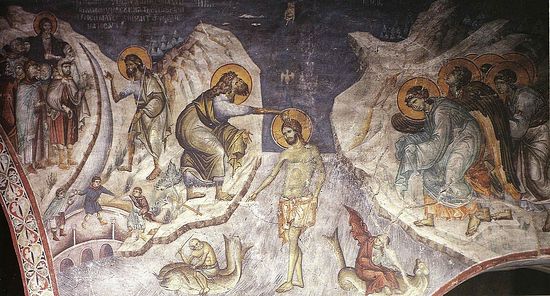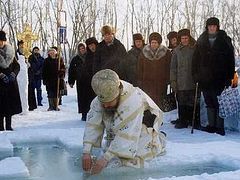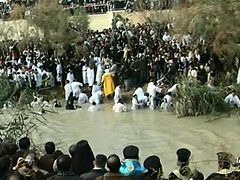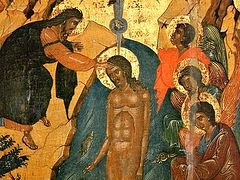In the Name of the Father, the Son and the Holy Spirit.
The day of the Theophany is the day when the whole world is being renewed and becomes a partaker of the sanctity of God. But at the same time, it is the day when Christ enters on the way to Calvary.
He came to John the Baptist at the Jordan not in order to be cleansed, because he was free of sin—both as God and in His humanity made pure throughout the history of Israel by those ancestors who had given their lives to God and whose sanctity culminated in the all-purity of the Mother of God, who was so pure, so stainless that She could be brought into the Holy of Holies, which even the High Priest dared not enter except once a year, and only after a special sanctification.
Christ did not need cleansing. But these waters, into which all the sinners who had come to John the Baptist confessing the evil of their lives had washed themselves, were as it were heavy with the sinfulness and therefore the mortality of mankind. They had become waters of death, and it is in these waters that the Lord Jesus Christ immersed Himself on that day, taking upon Himself the mortality resulting from the sin of man.
He comes, immortal in His humanity and His divinity, and at the same time He vests Himself with the mortality of the sinful world. This is the beginning of the way to Calvary. This is a day when we marvel at the infinite love of God. But as on every other occasion, man had to participate completely in the ways of salvation that God had provided. And this is why Christ comes and becomes partaker of our mortality, to save us. The culminating point will come on Calvary when He will say, My God, my God, why hast Thou forsaken me? It will be a moment when God as He was in His humanity will have lost communion with the Father by partaking of the destiny of mankind. This is the ultimate act of divine love.
Let us therefore today wonder and marvel, and worship this love of God, and learn from Him; because He said in the Gospel, I have given you an example. Follow it. We are called, within the limits of our sinfulness and humanity, to bear one another’s burdens, unto life and unto death. Let us learn from this. We find it so difficult to bear the burdens of even those whom we love—and practically impossible to shoulder the burdens of those whom we do not love with a natural, direct tenderness. Let us learn, because otherwise we will not have learned the first lesson that Christ gives us when He enters upon His ministry. Amen.




